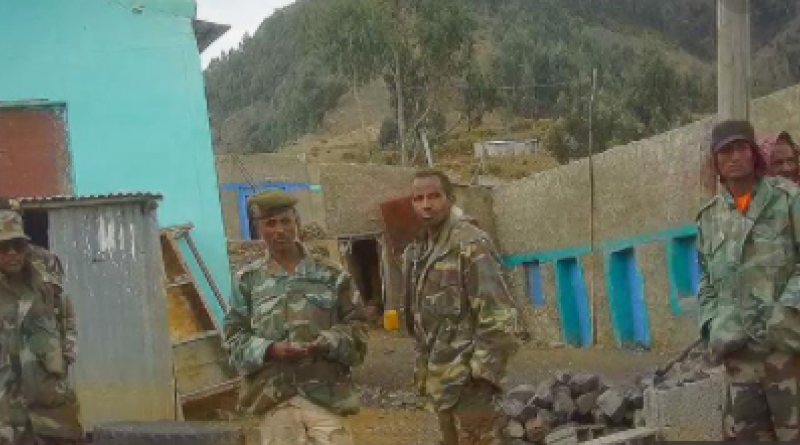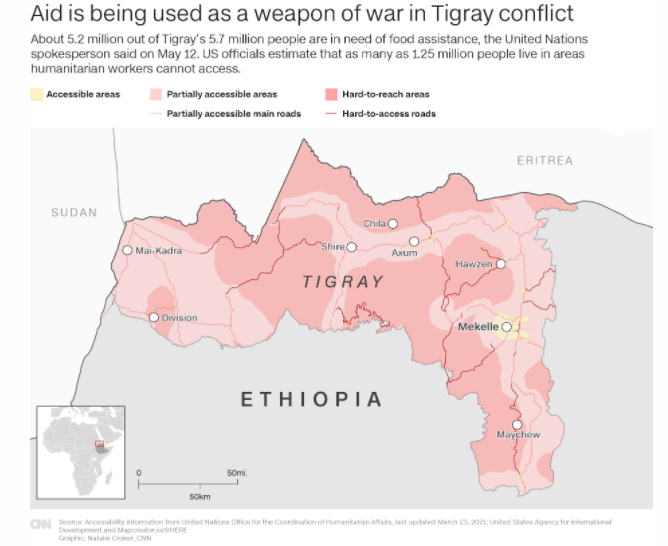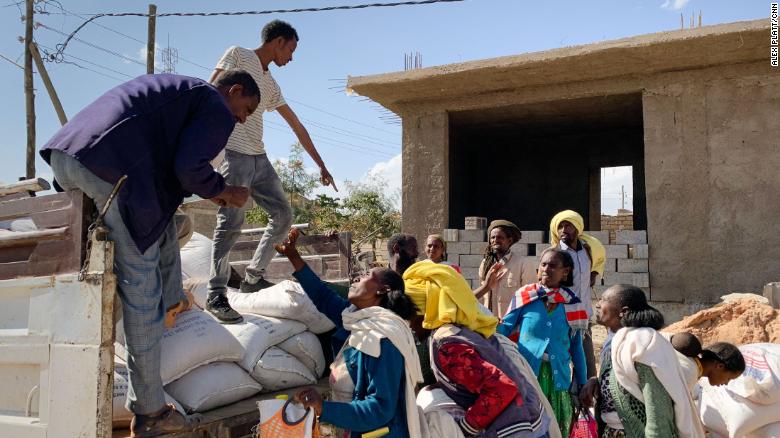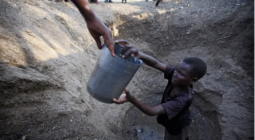UN confirms military forces blocking aid in Ethiopia's Tigray region following CNN investigation

(CNN)The United Nations has confirmed that military forces are impeding humanitarian access to parts of Ethiopia's war-torn Tigray region, after an exclusive CNN investigation revealed that Eritrean troops were coordinating with Ethiopian forces to cut off critical aid routes.
A CNN team traveling through Tigray's central zone witnessed Eritrean soldiers, some disguising themselves in old Ethiopian military uniforms, blocking aid to starving populations more than a month after Ethiopia's Nobel Peace Prize winning leader Abiy Ahmed pledged to the international community that they would leave.
In the UN's first statement confirming the obstruction of aid, spokesman Stephane Dujarric said Wednesday that "blockades by military forces" had severely impeded the ability for assistance to reach rural areas where the humanitarian crisis is worst.
"Of the three million people targeted to receive emergency shelter and non-food items, only 347,000 people, that is about 12 per cent, had been reached since 3 May. With the start of the rainy season, our humanitarian colleagues warn that it is critical that aid agencies can provide minimal dignified shelter for the displaced," the statement added.
At least 5.2 million people out of 5.7 million in Tigray are in need of emergency food assistance, according to the UN and Ethiopian government. US officials estimate that as many as 1.25 million people live in areas humanitarian workers cannot access.
Between March 27 and May 5, the government, the World Food Programme (WFP) and other partners provided food aid to more than 1.2 million people in 32 districts.
Dujarric added that the situation was "fluid and unpredictable."

On April 21, after being thwarted repeatedly by Ethiopian and Eritrean troops, a CNN team reporting with the permission of Ethiopian authorities traveled from the regional capital Mekelle to the besieged city of Axum, two weeks after it had been sealed off by the military. An aid convoy also made the seven-hour journey.
Many aid agencies are still being barred from the besieged city, where one of the few hospitals operating for miles is running out of essential supplies, including oxygen and blood, humanitarian workers working in the region told CNN.
At the Axum University Teaching and Referral Hospital, CNN interviewed the father of 7-year-old Latebrahan from Chila, who was being treated for malnutrition. Like many other rural border towns, Chila has been blocked off from receiving aid since the conflict began six months ago. Humanitarian workers say famine could have already arrived there and they would have no way of knowing.

"Based on guesswork there is a sense that in these areas that we are not able to access, out in the countryside for instance, places are falling into pockets of famine. But we're not able to verify that and that's part of the problem," Thomas Thompson, the WFP's emergency coordinator, told CNN.
The fighting in Tigray erupted during the autumn harvest season following the worst invasion of desert locusts in Ethiopia in decades. The conflict has plunged the region even further into severe food insecurity, and the deliberate blockade of food risks mass starvation, a recent report by the World Peace Foundation warned.
Eritrean soldiers have been blocking and looting food relief in multiple parts of Tigray, including in Samre and Gijet, southwest of Mekele, according to a leaked document from the Emergency Coordination Centre of Tigray's Abiy-appointed interim government obtained by CNN. In a PowerPoint presentation dated April 23, the center states that Eritrean soldiers have also started showing up at food distribution points in Tigray, looting supplies after "our beneficiaries became frightened and [ran] away."
That report was corroborated by humanitarian workers in Tigray, who said they had "protection" issues around distributing aid in some areas as civilians were later robbed of the aid by Eritrean soldiers. Emily Dakin, who leads the US Agency for International Development (USAID) Disaster Assistance Response Team in Tigray, also told CNN that she had received reports of health centers being looted, which was "contributing to some of the dysfunctionality of the hospitals."
Eritrea's Minister of Information Yemane Meskel has rejected these claims.
Following CNN's report, USAID on Thursday called again for full, unhindered access to Tigray.
"We are seeing a trend towards more restricted humanitarian access in Tigray," a spokesperson told CNN. "For example, as of May 12 access to Axum is possible, but inconsistent across our partners and changes on a day-to-day basis."
"We have called for full and unhindered access consistently since the start of the crisis. This is absolutely critical for the humanitarian community to scale up its response efforts to save lives and alleviate suffering in Tigray."
CNN reported Wednesday that Eritrean troops, in coordination with Ethiopian forces, had once more closed off key aid routes in central Tigray.
13 May 2021
CNN




